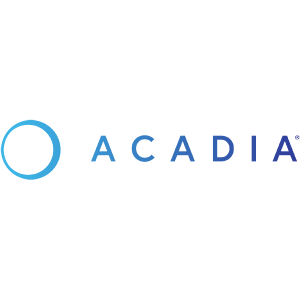Acadia Pharmaceuticals Initiates Phase 2 Clinical Trial of ACP-204 for the Treatment of Alzheimer’s Disease Psychosis
- None.
- None.
Insights
Analyzing...
The Phase 2 study is part of a seamless Phase 2 / Phase 3 program that includes three studies: a single Phase 2 study and two Phase 3 studies which have almost identical design. The Phase 2 study is a global, multi-center, randomized, double-blind, placebo-controlled trial that will enroll approximately 318 patients and evaluate ACP-204 30 mg and 60 mg doses compared to placebo. The primary endpoint is change from Baseline in the Scale for the Assessment of Positive Symptoms–Hallucinations and Delusions subscales (SAPS-H+D) total score at Week 6. The clinical trial sites will enroll seamlessly from Phase 2 into Phase 3. Each of the planned Phase 3 studies will enroll approximately 378 patients with ADP. Patients who complete the study will have the option of participating in a long-term open-label extension (OLE) study.
For more information about this study contact medicalinformation@acadia.com
About Alzheimer’s Disease Psychosis
According to the Alzheimer’s Association, more than 6.5 million people in
About ACP-204
ACP-204 works primarily as an inverse agonist at the 5-HT2A receptor. ACP-204 is currently being developed for the treatment of Alzheimer's disease psychosis, for which there is a large unmet medical need and no FDA-approved medication.
About Acadia Pharmaceuticals
Acadia is advancing breakthroughs in neuroscience to elevate life. For 30 years we have been working at the forefront of healthcare to bring vital solutions to people who need them most. We developed and commercialized the first and only approved therapies for hallucinations and delusions associated with Parkinson’s disease psychosis and for the treatment of Rett syndrome. Our clinical-stage development efforts are focused on treating the negative symptoms of schizophrenia, Prader-Willi syndrome, Alzheimer’s disease psychosis and neuropsychiatric symptoms in central nervous system disorders. For more information, visit us at www.acadia.com and follow us on LinkedIn and Twitter.
Forward-Looking Statements
Statements in this press release that are not strictly historical in nature are forward-looking statements. These statements include but are not limited to statements regarding the timing of future events. These statements are only predictions based on current information and expectations and involve a number of risks and uncertainties. Actual events or results may differ materially from those projected in any of such statements due to various factors, including the risks and uncertainties inherent in drug development, approval and commercialization. For a discussion of these and other factors, please refer to Acadia’s annual report on Form 10-K for the year ended December 31, 2022, as well as Acadia’s subsequent filings with the Securities and Exchange Commission. You are cautioned not to place undue reliance on these forward-looking statements, which speak only as of the date hereof. This caution is made under the safe harbor provisions of the Private Securities Litigation Reform Act of 1995. All forward-looking statements are qualified in their entirety by this cautionary statement and Acadia undertakes no obligation to revise or update this press release to reflect events or circumstances after the date hereof, except as required by law.
References
1 Alzheimer’s Association. 2023 Alzheimer’s Disease Facts and Figures. Alzheimers Dement 2023;19(4).
2 Rajan KB et al. Population estimate of people with clinical Alzheimer’s disease and mild cognitive impairment in
3 Cummings J et al. Criteria for Psychosis in Major and Mild Neurocognitive Disorders: International Psychogeriatric Associations (IPA) Consensus Clinical and Research Definition. Am J of Geriatric Psychiatry. 2020; 28(12): 1256-1269.
4 Ballard C et al. A prospective study of psychotic symptoms in dementia sufferers: psychosis in dementia. Int Psychogeriatr. 1997; 9(1): 57-64.
5 Scarmeas N et al. Delusions and hallucinations are associated with worse outcome in Alzheimer Disease. Arch Neurol. 2005; 62(10): 1601-1608.
6 Peters ME et al. Neuropsychiatric symptoms as predictors of progression to severe Alzheimer’s dementia and death: the Cache County Dementia Progression study. Am J Psychiatry. 2015; 172(5): 460-465.
View source version on businesswire.com: https://www.businesswire.com/news/home/20231122034474/en/
Media Contact:
Acadia Pharmaceuticals Inc.
Deb Kazenelson
(818) 395-3043
media@acadia-pharm.com
Investor Contact:
Acadia Pharmaceuticals Inc.
Al Kildani
(858) 261-2872
ir@acadia-pharm.com
Acadia Pharmaceuticals Inc.
Jessica Tieszen
(858) 261-2950
ir@acadia-pharm.com
Source: Acadia Pharmaceuticals Inc.







